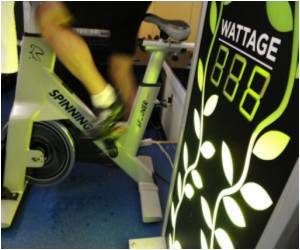While these recent gym-related deaths are indeed distressing, they can also serve as a catalyst for positive change within the fitness community.
- Recent gym-related deaths have raised concerns about safety during workouts, highlighting the importance of pre-exercise assessments
- Education and awareness about exercise safety, along with potential measures like having automated external defibrillators (AEDs) in gyms are being emphasized
- Balancing fitness goals with individual health and listening to one's body during exercise remains paramount
'And Just Like That,' everyone wondered: Is exercise safe?
Go to source).
Regular Exercise Decreases Heart Attacks
Dr. Sharonne Hayes, a cardiologist at the Mayo Clinic, emphasizes that all heart attack patients have underlying conditions that contribute to the event. Heart attacks are often decades in the making, dispelling the idea that a single exercise session can trigger one.Dr. Elizabeth Dineen, an assistant professor of cardiology at the University of California Irvine, reassures us that the risk of experiencing a fatal heart event during exercise is quite low. In fact, regular exercise can lower this risk significantly, especially when compared to a sedentary lifestyle.
Ways to Prevent Gym Attacks
Identify the Root Cause
A 2020 analysis by the American Heart Association highlights that the primary cause of sudden cardiac death related to exercise in middle-aged and older adults is Atherosclerosis, or plaque buildup in the arteries. Such events are rare and affect primarily men unaccustomed to exercise, while regular exercisers and women face substantially lower risks (2✔ ✔Trusted Source
Can exercise trigger a heart attack?
Go to source).
Gradual Transition
Dr. Dineen stresses the importance of a gradual transition into exercise, cautioning against sudden shifts from a sedentary lifestyle to intense workouts. Starting at a low intensity and gradually increasing exercise frequency can prevent complications.
The Importance of Pre-Exercise Assessment
Dr. Brandee Waite, director of sports medicine at UC Davis Health, underscores the importance of seeking a doctor's clearance before starting a new exercise routine, especially for those with underlying health issues. Age alone should not deter individuals from exercise, as fitness levels vary widely among people.
Health experts emphasize the importance of pre-exercise assessments, particularly for those who are new to fitness routines or have pre-existing health concerns. These assessments can help identify potential risks and tailor exercise programs accordingly.
Exercising Safely
Exercise can be safe and enjoyable when approached with caution. People should engage in exercise unless their physician advises otherwise, and restrictions are typically temporary.
The Need for Automated External Defibrillators (AEDs).
In light of these events, some experts suggest that gyms should consider having automated external defibrillators (AEDs) readily available. AEDs can be lifesaving in cases of sudden cardiac arrest.
Addressing Misconceptions
While some heart attack survivors blame their attacks on extreme exertion, it's important to remember that heart attacks result from the rupture of fatty plaque in arteries, typically in individuals with underlying risk factors. Individuals need to screen themselves of any risk factor and treat the causative of it. Some common risk factors include obesity, hypertension, fatty liver etc.Snow-Shoveling Factor , the urban legend of heart attacks during snow shoveling, such incidents are rare and more likely in individuals with existing risk factors. Proper precautions, like dressing warmly and taking breaks, can reduce the risk.
Exercise and Sudden Cardiac Death
Dr. Timothy Noakes' perspective on exercise and sudden cardiac death is explored, emphasizing that regular exercise reduces overall risk but may increase the risk of sudden death during extreme exertion in individuals predisposed to heart disease.The key to a healthy heart is maintaining a regular exercise routine. From various evidences it's clear that Gym Attacks can be avoided by taking precautionary measures. The solution is to understand your body and avoid exertion pushing your limits.
Individuals who consistently exercise face a lower risk of heart attack than those who sporadically engage in intense activity.
References:
- 'And Just Like That,' everyone wondered: Is exercise safe? - (https://www.heart.org/en/news/2021/12/15/and-just-like-that-everyone-wondered-is-exercise-safe)
- Can exercise trigger a heart attack? - (https://myheartsisters.org/2009/07/11/exercise-trigger/)
Source-Medindia
















